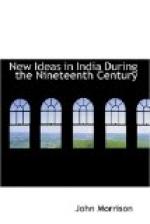B.C. and the fourth and fifth centuries A.D., and
the paternal benevolence of Asoka, the great Buddhist
emperor of the third century B.C., deserves record
and all honour. Let Indians know definitely who
deserves to be called an ancient Indian emperor, when
they wish to lament a lost past; and descending to
historical fact and detail, let them compare that period
with the present. The later empire referred to
was an empire only in the old sense of a collection
of vassal states. Turning back to the hoary past,
in which many Indians, even of education, imagine there
was a golden Indian empire, we can trace underneath
the ancient epic, the Ramayan, a conquering progress
southward to Ceylon itself of a great Aryan hero,
Ram. But of any Indian empire founded by him,
we know nothing. “One who has carefully
studied the Ramayan will be impressed with the idea
that the Aryan conquest had spread over parts of Northern
India only, at the time of the great events which form
its subjects."[37] Coming down to the period of the
greatest extent of the Moghul empire in India in the
end of the seventeenth century, we find the Emperor
Aurangzeb with as extensive a military empire as that
of Asoka, but with the Mahrattas rising behind him
even while he was extending his empire southwards.
That decadent military despotism cannot be thought
of as a union of India. In truth, the old Aryan
conquest of India was not a political conquest, and
never has been; it was a conquest, very complete in
the greater part of India, of new social usages and
certain new religious ideas. The first complete
political conquest of India by Aryans was the British
conquest, and the ideas which have come in or been
awakened thereby, we are now engaged in tracing.
As regards the new idea of nationality, we have noted
that the new national name Indian now heard
upon political platforms, is not a native term, but
an importation from Britain along with the English
language. How, indeed, could the educated Indian
employ any other term with the desired comprehensiveness?
If he speak of Hindus, he excludes Mahomedans
and followers of other religions; if he use a Sanscrit
term for Indians, he still fails to touch the
hearts of Mahomedans and others who identify Sanscrit
with Hindus. There is no course left but to use
the English language, even while criticising the British
rulers. The English language has been a prime
factor in evoking the new national consciousness,
and in the English language the Indian must speak to
his new found fellow Indians.[38] Even a considerable
portion of the literature of the attempted Revival
of Hinduism is in English, strange as the conjunction
sounds.




